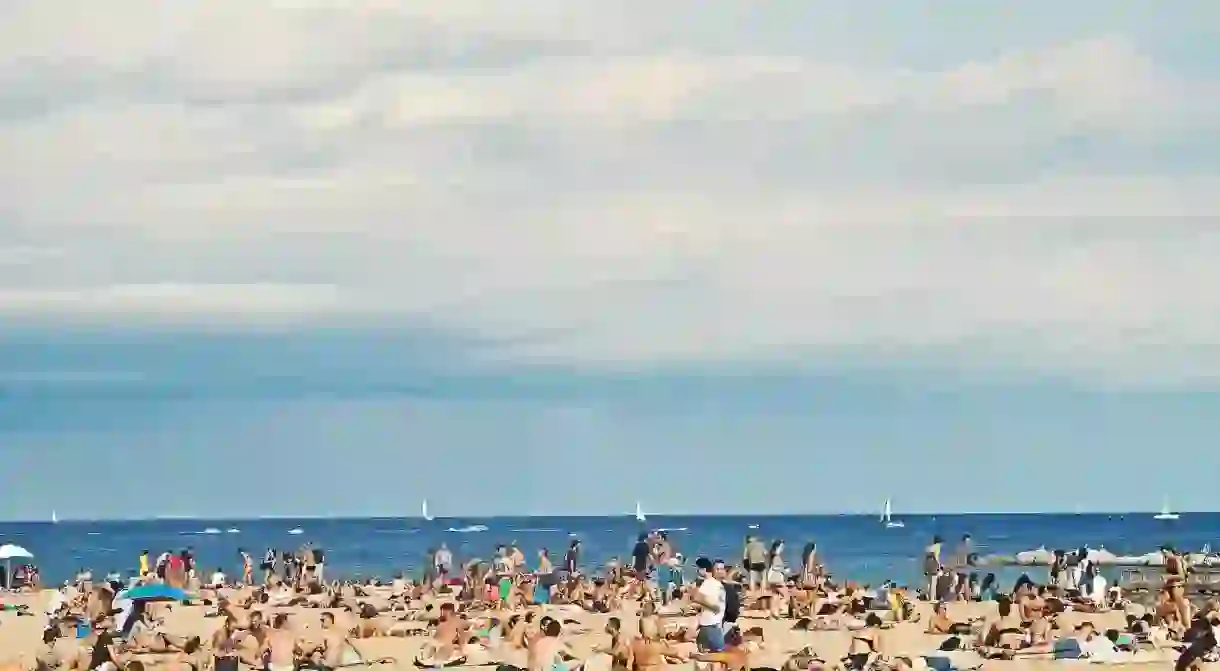A Brief History of Barceloneta Beach

The most popular beach in Barcelona, Barceloneta beach, is located next door to the city centre and can easily be accessed by foot, taxi or public transport. Now an iconic feature of Barcelona’s landscape, Barceloneta beach is just as much a place to swim or sunbathe as a place to socialise and enjoy the city’s nightlife.
From rags to riches
If, these days, Barceloneta beach has become a symbol of Barcelona’s status as a major tourist destination – a cosmopolitan culture capital and sunny beach town – it’s easy to forget that until relatively recently the area was something of a problematic area. In fact, as recently as thirty years ago, no one would have imagined going for a swim or even sunbathing on Barceloneta beach, because there quite simply wasn’t one there.
Home to a handful of factories and the rudimentary homes of local fishermen, the Barceloneta had been rather neglected since the time of its creation in the 18th century. However, as they did in many other parts of the city, the 1992 Olympic Games brought about radical transformation that permanently changed the face of the Barceloneta.
The local authorities ordered the creation of a two-mile strip of beach, and the iconic Passeig Maritim, today home to some of the city’s most iconic landmarks, was envisioned with bars, restaurants and luxury hotels. Suddenly, the Barceloneta was in the spotlight, and the city had acquired a new place to socialise, relax and have fun.

An urban oasis… of sorts
Barceloneta beach is remarkable for being on the doorstep of the city centre, literally just a few hundred meters from famous sites such as La Rambla, the Gothic Quarter or the Park Ciutadella. This makes getting to the beach incredibly easy and makes for spending a couple of hours at the beach easy to fit into your day.
However, you could say that the beach’s popularity may also have been its downfall. In 2008, the World Health Organization launched an investigation into the quality of the sand on Barceloneta beach after there were concerns over the levels of microbial life found in the water and sand.
That’s not the only controversy to have plagued the beach either, as the council announced in 2016 that the beach had lost over a quarter of its surface area since 2010. An artificial beach, Barceloneta beach was created using sand imported from abroad and has occasionally required ‘topping up’ as waves and weather erode it. The council said that over 50% of the sand added in 2008 and 2010 had been lost and would cost an expected €800,000 to replace.

A place to see and be seen
Despite some of the controversy that at times overshadows it, Barceloneta beach is one of the most popular places in Barcelona. The beach and surrounding area has something to offer everyone: outdoor gym areas, open-water swimming lanes, late-night bars, gourmet restaurants and, of course, some remarkable landmarks.
Stroll down the Passeig Maritim, and you won’t help but notice Frank Gehry‘s eye-catching El Peix: a 52m metal sculpture of a golden fish, shimmering by the waterfront. Other public artworks include Rebecca Horn’s Homenatge a la Barceloneta, a homage to the neighbourhood and the people who once inhabited the beach.
But this is also very much a place to be seen, and some of the city’s most popular nightclubs such as Pacha and Carpe Diem can be found at the north of Barceloneta beach, near Port Olimpic. These clubs host big-name international DJs and attract both locals and those visiting Barcelona.

Even if Barceloneta beach remains at threat of erosion from bad weather, there’s no doubt that it has played a crucial role in making Barcelona the prime travel destination it is today.













